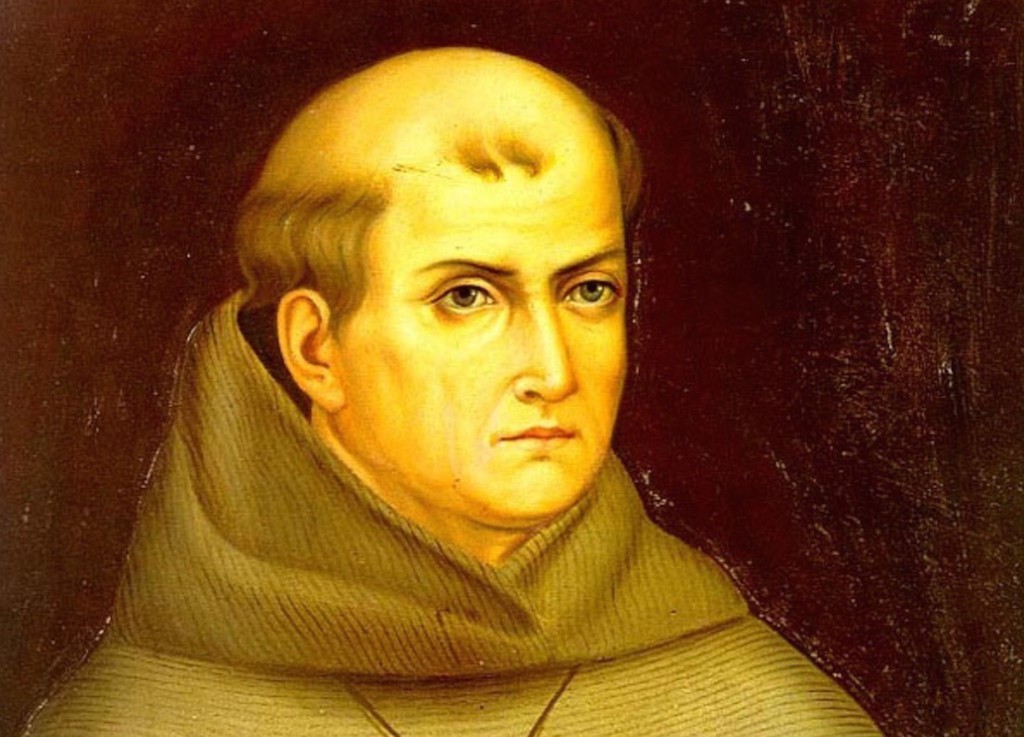Blessed Junipero Serra
Today, Pope Francis will canonize Blessed Junipero Serra, the Franciscan, who brought the Gospel to the indigenous people of Mexico and California.

Today, Pope Francis will canonize Blessed Junipero Serra, the Franciscan missionary, originally from Spain, who brought the Gospel to the indigenous people of Mexico and the area we now know as California.
Born Miguel Ferrar in 1713, he entered the Franciscan seminary in 1730, taking the name Junipero, or Juniper. From the outset, Junipero excelled at his academic studies. He earned a doctorate in theology, and was appointed a university professor by the time he reached the age of thirty.
In 1749, Junipero and several companions secured permission to travel from Spain to Mexico, which was then a Spanish colony, where they were to work with the indigenous population in missions already established in and around Mexico City. For fifteen years, Junipero distinguished himself as a preacher and confessor, and also as an academic in his lectures at the College of San Fernando, in Mexico City.
In 1768 Junipero was asked by his superiors to leave “Baja" or “Lower California," and establish missions in the area then known as “Alta California." He and some companions set out walking north. For the next sixteen years, until his death in 1784, Junipero walked the length and breadth of “Alta California," from San Diego to San Francisco, establishing mission churches, preaching and evangelizing the indigenous people. Under his leadership nine missions and mission churches were established. Perhaps the most famous is Mission San Juan Capistrano. Built in 1782, it is thought to be the oldest standing building in California, and the only remaining original mission in which Blessed Junipero celebrated Mass.
There has been some controversy about how to understand the missionary work carried out by Blessed Junipero. Some see him as a man of extraordinary faith, who gladly suffered hardship and deprivation for the sake of the Gospel. Others see him as a symbol of oppression with respect to the indigenous people, since with their embrace of Christianity, they were constrained to give up their own culture and lifestyle. Detractors also point to the number of indigenous people who contracted fatal diseases because of their contact with European colonizers.
Defenders see Blessed Junipero as a man of his own time, and motivated solely by a love of the Gospel. Archbishop Jose Gomez of Los Angeles said of Blessed Junipero: “(He) believed with all his heart that the Gospel was true. Out of love, he was willing to give up everything – family and home, security and fortune, even his very life – to bring the truth of salvation to people living on the other side of the world, people he did not know, people who did not share his language and customs."
In January 2015, when announcing the upcoming canonization, Pope Francis made two important points. The first was that Blessed Junipero was to be canonized through a legal provision called “equivalent canonization." That means that the petition for sainthood did not through all the steps required, right down to the miracles. Rather, a person who has been designated as “blessed" for some time, and is venerated as a saint by the people, is brought to the end of the canonization process based on the evidence of his or her life. Junipero Serra, who died in 1784, had been beatified by Pope John Paul II in 1987.
The second point Pope Francis made was that Blessed Junipero, “the evangelizer of the western United States," is one of a group of who either have been or will be canonized because they gave their lives to the service of the Gospel. They are examples of what it means to preach the Gospel without reserve. In addition to Blessed Junipero, others being publically declared saints through this equivalent process are Peter Faber, who spent his life preaching the Gospel in Europe; François de Laval and Marie de l'Incarnation who evangelized Canada, José de Anchieta of Brazil and Joseph Vas of Sri Lanka. All these, Pope Francis said, are “Impressive evangelizers along the lines of Evangelii Gaudium. That is why I chose them. That was the reason.
Sister Elissa Rinere, C.P.